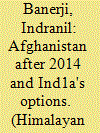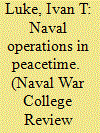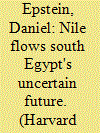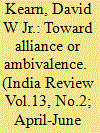|
|
|
Sort Order |
|
|
|
Items / Page
|
|
|
|
|
|
|
| Srl | Item |
| 1 |
ID:
128389


|
|
|
|
|
| Publication |
2011.
|
| Summary/Abstract |
Current speculation on the future of Afghanistan revolves around 2014, the year US forces are supposed to finally end their Afghan War mission. The key question is what will happen once the Americans depart? What sort of Afghanistan would emerge after that? Would the Taliban once again overrun that country and establish a ruthless Islamic emirate? Or would the pro-West regime in Kabul survive with the aid of the fledgling Afghan National Army and police? And where would all that leave India?
|
|
|
|
|
|
|
|
|
|
|
|
|
|
|
|
| 2 |
ID:
131457


|
|
|
|
|
| Publication |
2014.
|
| Summary/Abstract |
This research examines the role of the Lebanese Armenian diaspora (LAD) during the unstructured conflict that was the second Lebanese civil war, which extended from 1975 until 1990. This research has two aims. The normative aim is to find patterns of diasporic activity in conflict such as to support positive activities and discourage negative activities. A second is to focus on an empirical case study of the LAD in order to demonstrate that the diaspora encouraged peace-making initiatives and discouraged peace-wrecking. Importantly, the LAD as a political actor in Lebanese society played a positive role in promoting dialogue, cooperation, conflict resolution and reconciliation and had a significant impact on politics in general and conflict behaviour in particular. This study concludes that it is worth studying diaspora behaviour in conflict because a diaspora could be a powerful actor in conflict resolution and peace-making.
|
|
|
|
|
|
|
|
|
|
|
|
|
|
|
|
| 3 |
ID:
133387


|
|
|
|
|
| Publication |
2013.
|
| Summary/Abstract |
The article discusses U.S. naval operations in peacetime conditions as of Spring 2013. It argues that naval planners, theorists, and practitioners should adjust their approaches to peacetime naval operations, and that naval theory is not appropriate for peacetime missions. The article discusses the impact of globalization on maritime commerce, the evolution of criminal and military threats to U.S. national security, and the changing nature of international maritime law. The author presents an alternative framework aimed at reconceptualizing naval operations from peacetime to a war footing.
|
|
|
|
|
|
|
|
|
|
|
|
|
|
|
|
| 4 |
ID:
132538


|
|
|
|
|
| Publication |
2014.
|
| Summary/Abstract |
As US citizens celebrated their independence and self-rule on July 4, 2013, they opened their newspapers to find that Egyptians had surrendered theirs. The previous day, amid impassioned protests across the country against the Muslim Brotherhood-led government, the Egyptian Armed Forces removed President Mohammad Morsi from power. For a time, the move dominated headlines. Columnists, academics, and statesmen debated the ethics and ramifications of the coup. But soon, the world moved on. Despite Egypt's vital ongoing struggle to build a nation, coverage of the effort moved out of the mainstream. Now, almost nine months later, Egypt deserves a second look. In late January 2011, Hosni Mubarak, who had governed Egypt since 1981, was overthrown after weeks of mass protest across the country. In the November elections the Muslim Brotherhood, previously illegal, was swept into power with 52 percent of the vote. In June 2012, Muhammad Morsi, a member of the Brotherhood, became the first freely elected President in Egyptian history. Egypt's (seemingly) successful transition to civilian rule drew accolades from the international community. Another victory for democracy. But things were not as rosy as they seemed.
|
|
|
|
|
|
|
|
|
|
|
|
|
|
|
|
| 5 |
ID:
132079


|
|
|
|
|
| Publication |
2014.
|
| Summary/Abstract |
Utilizing prevailing International Relations theory, this article seeks to explain the conditions under which India and the United States can be expected to achieve deep, long-term, strategic cooperation that could culminate in a formal alliance. Specifically, it considers the insights and predictions of realist and liberal theories while also considering critical domestic level factors that may shape India's capacity to be a reliable and attractive partner. While dramatic progress has been made since the initial thawing of the Cold War relationship, this article concludes that the future is likely to be a mixed bag, as the recent Obama experience has reflected. Only the emergence of an overtly revisionist China is likely to drive New Delhi and Washington toward a traditional alliance.
|
|
|
|
|
|
|
|
|
|
|
|
|
|
|
|
|
|
|
|
|